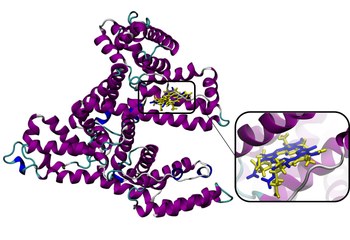
ITACA: Improving Photosensitizer Performances by Protein Carriers
Principal investigator: Dr Edoardo Jun Mattioli
Background
Photodynamic therapy (PDT) is a non-invasive treatment for different types of cancer. PDT is based on the use of photosensitizer molecules (PS) able to promote the generation of reactive oxygen species (ROS) through light irradiation to locally kill tumoral cells. PSs represent the core elements in PDT and their intrinsic properties determine the efficiency of the therapeutic treatment.
The actual limitations of PDT are due to lipophilic character of PSs, i) low solubility in water restricts their medical use (ii) high tendency to aggregation determines a very low stability in physiological environment and a reduction of ROS production efficiency; iii) low biocompatibility.
Hypothesis
Proteins are biocompatible and soluble in a physiological environment. Moreover, proteins can act as natural supramolecular hosts. The use of a protein as PS carrier (PS@protein) will bypass all the limitations of PS in PDT, conferring to the PS: i) water solubility; ii) monodispersity in physiological environment; iii) biocompatibility. In addition, the electronic properties of the PS will be tuned by the binding with proteins and efficacy of PDT will be improved by protein encapsulation.
Aims
In ITACA we will focus on Temoporfin (Foscan®) and Talaporfin (Laserphyrin®), two chlorin-based PS, clinically approved. A virtual screening approach will be used to identify the best carrier proteins for the two PS. The PS@protein complexes will be synthesized and characterized, and the PDT performances of the PS@protein complexes will be evaluated in vitro in cellular models.
Expected Results
This research will combine computational and experimental techniques to find host proteins able to disperse monomolecularly Temoporfin and Talaporfin in physiological environment. Protein dispersion will improve the i) solubility of the PS that limits its PDT performance, ii) biocompatibility of the PS, reducing the dark toxicity typical of many PDT agents, iii) cellular uptake of the PS iv) generation of the ROS production and global PDT performances
Impact On Cancer
ITACA project will have a significant impact on cancer leading to the:
- improvement of the performances of already clinically approved PDT agents
- development of a theranostic platform able to detect and image cancer cells
- development of a specific treatment at the desired site of action, by using a highly focused irradiation source
- use of "soft" irradiation sources as light to activate the cancer therapy